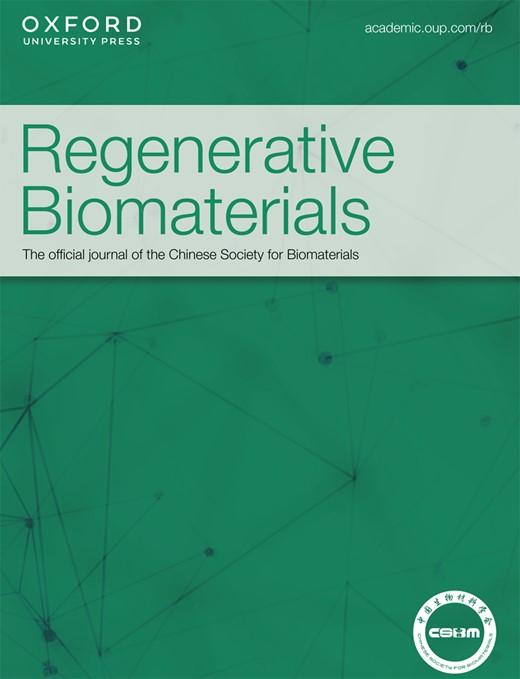牙源性干细胞在组织工程中的作用:生物材料和宿主反应
IF 8.1
1区 医学
Q1 MATERIALS SCIENCE, BIOMATERIALS
引用次数: 0
摘要
牙源性干细胞(Dental-derived stem cells, DSCs)因其易于获取、生长能力强、免疫原性低而成为极具吸引力的细胞来源。它们可以响应多种细胞外基质(ECM)信号,这些信号提供生物物理和生化线索来调节驻留细胞的命运。然而,直接移植dsc存在向功能细胞增殖分化差、局部炎症导致成活率低的问题。最近,在新型生物材料的设计上取得了令人瞩目的进展,这为使用仿生生物材料来调节各种细胞行为(包括增殖、分化和迁移)带来了希望。生物材料可以被定制为具有多种功能,例如,刺激反应。有必要总结工程生物材料介导的dsc的递送和治疗及其潜在应用的最新进展。在此,我们概述了支持dsc的生物材料的设计和宿主对移植的反应。本文章由计算机程序翻译,如有差异,请以英文原文为准。
Dental-derived Stem Cells in Tissue Engineering: The Role of Biomaterials and Host Response
Abstract Dental-derived stem cells (DSCs) are attractive cell sources due to their easy access, superior growth capacity, and low immunogenicity. They can respond to multiple extracellular matrix (ECM) signals, which provide biophysical and biochemical cues to regulate the fate of residing cells. However, the direct transplantation of DSCs suffers from poor proliferation and differentiation towards functional cells and low survival rates due to local inflammation. Recently, elegant advances in the design of novel biomaterials have been made to give promise to the use of biomimetic biomaterials to regulate various cell behaviors, including proliferation, differentiation, and migration. Biomaterials could be tailored with multiple functionalities, e.g., stimuli-responsiveness. There is an emerging need to summarize recent advances in engineered biomaterials-mediated delivery and therapy of DSCs and their potential applications. Herein, we outlined the design of biomaterials for supporting DSCs and the host response to the transplantation.
求助全文
通过发布文献求助,成功后即可免费获取论文全文。
去求助
来源期刊

Regenerative Biomaterials
Materials Science-Biomaterials
CiteScore
7.90
自引率
16.40%
发文量
92
审稿时长
10 weeks
期刊介绍:
Regenerative Biomaterials is an international, interdisciplinary, peer-reviewed journal publishing the latest advances in biomaterials and regenerative medicine. The journal provides a forum for the publication of original research papers, reviews, clinical case reports, and commentaries on the topics relevant to the development of advanced regenerative biomaterials concerning novel regenerative technologies and therapeutic approaches for the regeneration and repair of damaged tissues and organs. The interactions of biomaterials with cells and tissue, especially with stem cells, will be of particular focus.
 求助内容:
求助内容: 应助结果提醒方式:
应助结果提醒方式:


